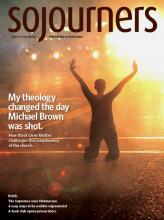THE POPE'S “climate change encyclical,” Laudato Si’ (“Praise Be to You”), is actually far more than that: It is the most remarkable religious document in a generation, offering a powerful and comprehensive worldview that is consonant with the Bible and hence profoundly countercultural. You owe it to yourself to take a few hours and read it slowly and carefully; you’ll be enlightened, but mostly, if you’re like me, you’ll be reassured. Reassured that someone powerful in this world actually sees our time for what it is, and understands the crises facing our planet for what they are.
Near the beginning, for instance, the pope discusses the “rapidification” of life, the sense that “the speed with which human activity has developed contrasts with the naturally slow pace of biological evolution. Moreover, the goals of this rapid and constant change are not necessarily geared to the common good or to integral and sustainable human development. Change is something desirable, yet it becomes a source of anxiety when it causes harm to the world and to the quality of life of much of humanity.”
That’s as useful a description of the last 100 years as we’re likely to get, that sense of life out of balance. It affects the poor, yes, and the pope is always most mindful of the poor—but it also affects everyone. The ever-more-technologized world we inhabit no longer makes us happier. It makes us stressed.
Read the Full Article

